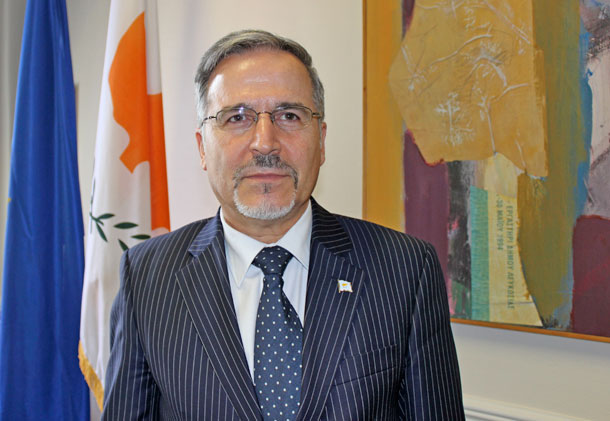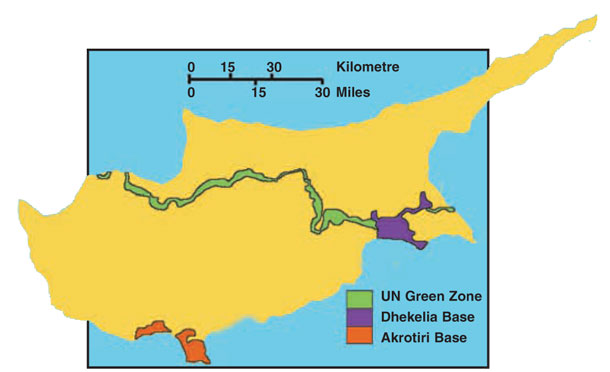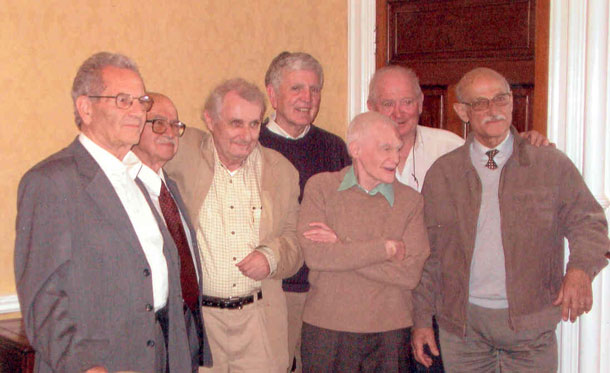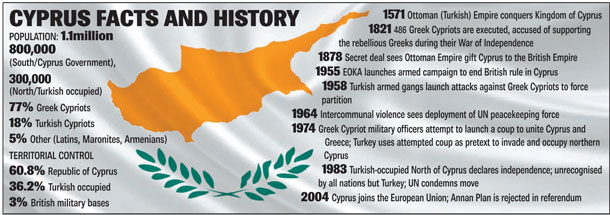2 June 2014 Edition
Cyprus – Struggling to end partition
As Cyprus’s reunification talks recommence after 18 months of non-contact between the Cypriot and Turkish governments, MARK MOLONEY meets Cyprus’s Ambassador to Ireland, DR MICHALIS STAVRINOS

• Cypriot Ambassador to Ireland Dr Michalis Stavrinos at the Embassy in Dublin
United Nations Security Council Resolution 541: “Therefore, that the attempt to create a ‘Turkish Republic of Northern Cyprus’ is invalid and will contribute to a worsening of the situation in Cyprus”
CYPRUS AND IRELAND share a similar contemporary history. In the 20th century, these two small island nations fought back against occupation by the British Empire. Both Ireland and Cyprus later found themselves partitioned, their north-eastern corners held by a much larger neighbour.
After its anti-colonial war against the British spearheaded by the National Organisation of Cypriot Fighters (EOKA), Cyprus was invaded and partitioned by Turkey. In July 1974, the right-wing military junta then ruling Greece, with the collusion of a handful of Greek Cypriot collaborators on the island, carried out a coup to overthrow the democratically-elected government of Cyprus. Even though in the five days before the Turkish invasion, on 20 July, not a single Turkish Cypriot (who made up around 18% of the population) was killed or even injured, Ankara used the coup as a pretext and invaded Cyprus, on the pretext of restoring constitutional order and protecting the Turkish Cypriots.
After order was restored three days later, instead of withdrawing its forces, Turkey occupied more than a third of Cyprus’s territory and has continued to do so for the past 40 years, in spite of UN resolutions calling for their withdrawal.
Michalis’s family left Cyprus for Athens during this period to get away from what he describes as “The Troubles”. He spent several years working as a lawyer and later a legal adviser to the Greek Ministry of Foreign Affairs. Returning to Cyprus in 1989, he served extensively in the diplomatic corps and was appointed Ambassador to Ireland in 2011.
Status quo ‘unacceptable’
The latest round of talks aimed at solving the partition of Cyprus began with a joint communique in February. In it, both sides describe the status quo as “unacceptable” and say the talks are aimed at “ensuring their common future in a united Cyprus within the European Union”. It added that the settlement will be based on “bi-communal, bi-zonal federation with political equality”, that all options are on the table and importantly that “nothing is agreed until everything is agreed”.
The discovery of offshore oil and gas in the exclusive economic zone of Cyprus has sparked the interest of the US and the EU in finding a solution.
Despite so many failed starts, Michalis is optimistic about this round of talks.
“There were endless efforts for the last 40 years or so,” he tells An Phoblacht at the Embassy of the Republic of Cyprus in Dublin. “But unfortunately, due to Turkey’s intransigence, it is an ongoing problem.
“Turkey insists on the right to unilateral intervention, the right to keep armed forces on the island and the right to legitimise the settlers. That is a huge problem.
“Since 1974, Turkey has been bringing tens of thousands of settlers to the island. We have reached the point today where the settlers actually outnumber the Turkish Cypriots. The Turkish Cypriots as well as the Greek Cypriots are very unhappy about this situation,” he tells me.
“Cyprus is very small to be a country, never mind to be divided into two. Turkey is huge, one of the biggest in Europe; they don’t need to expand into Cyprus.”

• Map shows the partition of Cyprus as well as the two huge British bases on the island
In a similar vein to the situation in Israel, the settlers who have arrived are far more extreme in their political and religious views than the native population from both communities.
In 2004, the ‘Annan Plan’, which aimed to reunify the island as a federation of two states under the name “United Republic of Cyprus”, was rejected by the people at referendum: 76% of Greek Cypriots opposed the plan with 65% of Turkish Cypriots supporting it. For many outsiders, it is hard to understand why this happened.
“Unfortunately, among the Turkish Cypritos the settlers were also given the right to vote (which was completely illegal and unacceptable) and this is why you got these percentages,” says Michalis.
The failure of the plan to allow Greek Cypriots return to their homes which were taken from them by Turkish troops and settlers, and the legitimisation of the presence of illegal settlers and the Turkish military presence, meant Greek Cypriots could not support it.
“When you are one of the smallest nations in Europe, facing the largest standing army on the continent — one of 500,000 soldiers — you have to make certain compromises, but not on human rights and basic principles,” says Michalis.
Turkey unilaterally froze any contact with Cyprus in late 2012 while Cyprus held the presidency of the European Union. It continued to freeze talks until after the most recent Cypriot election. Turkey then demanded the quick resumption of talks, deadlines and said that if these talks fail then they should be the last ones.
“Because of our experience dealing with the Turkish government in the past,” Michalis says, “we insisted on a joint communique, a framework with principles.”
Famagusta – tourist ghost town
On the east coast of Cyprus lies the city of Famagusta. In the 1960s, its Varosha region was one of the most popular tourist resorts on the planet. High-rise hotels and apartment complexes line its sandy beaches. In 1974, it was fenced off by the Turkish military following the invasion and its Greek Cypriot residents forced to flee. It now sits frozen in the exact state which it was left in 40 years ago. This ghost town, with its crumbling buildings and overgrown gardens, may prove key in building reconciliation, says Michalis.
He argues that, in order not to influence the territorial issue of the current round of talks, the town could be returned to the Cyprus Government under the auspices of the United Nations. It needs full reconstruction and this could be a project on which the two communities could work together, creating employment and business opportunities.
“In return,” he suggests, “we will allow the illegal regime to trade from there with the outside world. The port of Famagusta could operate under the rules of the EU. So it’s a win-win proposal.”
Without a solution to the Cyprus problem, Turkey’s push for accession to the European Union should be doomed to failure, he says.
“It is not acceptable to have a country applying to join the European Union and at the same time occupying part of a member state.
“We hope Turkey will come to terms with logic,” says Michalis. “Erdogan has the power, if he has the willingness, to achieve something on the Cyprus problem. If he does this, he will change the image of Turkey. It will be a country which could play a major role, a country without the burden of being an illegal occupier. We are reservedly optimistic and we hope that with the assistance of friendly countries, including Ireland, that we will finally achieve a solution.”
As well as contending with Turkish occupation, a further 3% of Cyprus is under the control of the British military with ‘Sovereign Base Areas’ at Akrotiri and Dhekelia. In 2001, plans to extend Akrotiri base where strongly opposed by locals, resulting in rioting which left 40 British police officers injured and their police station destroyed in the clashes.
“Following the anti-colonial struggle of EOKA and the independence of Cyprus in 1960, the imposed conditions on the people of Cyprus was the retention by Britain of two large military bases. The presence of these bases in anachronistic. You cannot be partners in the EU and keep military bases in other countries.”
He says Cyprus is in a position to offer the use of its territory for purposes that it will decide is in the common interest — but never against the territory or independence of another nation.
Finally, he has a message for the people of Ireland.
“I particularly would like to thank the Irish Government, political parties and people for their firm support in finding a solution in Cyprus. You have been through a similar imposed division and your understanding and support is always there.
“The participation of Irish soldiers in the peacekeeping force in Cyprus is something which is highly appreciated by the people and Government of Cyprus and we are looking forward with your assistance to find a peaceful, lasting solution.”
Cyprus and the IRA

• Irish and Cypriots who spent tine in English prisons in the 1950s meeting in Dublin, 2008. Vias Livadas, Renos Kyriakides, Séamus Murphy, Pat Farrelly, Manus Canning, Séamus Greally and Demetri Filiastides
IN the 1950s, IRA and Cypriot EOKA anti-colonial fighters were held together in Wormwood Scrubs Prison in England. Both sets of political prisoners worked closely with each other, planning escapes and protecting each other from attacks by English prisoners. In July 1958, EOKA activist Nicholas Ioannou, who was co-ordinating organising escape attempts for Irish and Cypriot prisoners, was killed in a motorcycle crash. The prisoners were convinced that he was assassinated as the documents he was carrying at the time disappeared and the lorry which killed him was driven by a warden from Wakefield Prison, almost 200kms away. His sister maintains that a Scotland Yard police officer told her they “didn’t mean to hurt him, just get the documents”.
A succesful escape attempt would come several months later, in February 1959, when IRA prisoner Séamus Murphy escaped from Wakefield Prison and returned to Ireland. Four other would-be escapees (two Irish and two Cypriots) were captured by wardens during the attempt. The escape was funded by a Cypriot woman, Katina Pilina, who donated her entire wedding dowry to fund the operation. Séamus Murphy would meet Katina for the first time 50 years later at a book launch in the Pearse Centre in Dublin.

Cyprus Facts
Population: 1.1million
800,000 (South/Cyprus Government),
300,000 (North/Turkish occupied)
77% Greek Cypriots
18% Turkish Cypriots
5% Other (Latins, Maronites, Armenians)
Territorial control
60.8% Republic of Cyprus
36.2% Turkish occupied
3% British military bases
Cyprus History
1571 Ottoman (Turkish) Empire conquers Kingdom of Cyprus
1821 486 Greek Cypriots are executed, accused of supporting the rebellious Greeks during their War of Independence
1878 Secret deal sees Ottoman Empire gift Cyprus to the British Empire
1955 EOKA launches armed campaign to end British rule in Cyprus
1958 Turkish armed gangs launch attacks against Greek Cypriots to force partition
1964 Intercommunal violence sees deployment of UN peacekeeping force
1974 Greek Cypriot military officers attempt to launch a coup to unite Cyprus and Greece; Turkey uses attempted coup as pretext to invade and occupy northern Cyprus
1983 Turkish-occupied North of Cyprus declares independence; unrecognised by all nations but Turkey; UN condemns move
2004 Cyprus joins the European Union; Annan Plan is rejected in referendum



